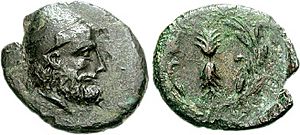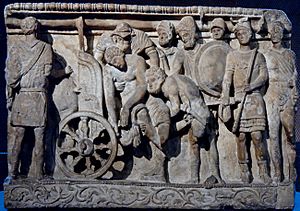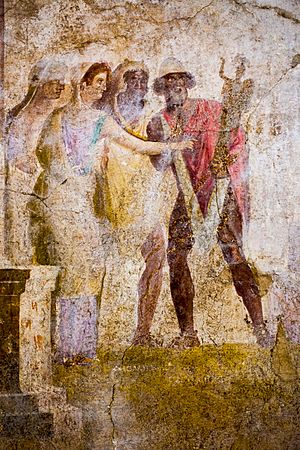Odysseus facts for kids
Odysseus was a famous hero in Greek mythology. He was the king of the island of Ithaca. Odysseus was married to Penelope, and they had a son named Telemachus. He is a main character in two epic poems by Homer: the Iliad and the Odyssey. Odysseus was known for being very smart, clever, and adaptable. People often called him "Odysseus the Cunning."
Odysseus fought in the Trojan War. He came up with the idea for the Trojan Horse, which helped the Greeks win the war. After the war, his exciting journey home took 10 years. The story of this long journey is told in the Odyssey.
His Latin name is Ulysses.
Contents
Odysseus in Mythology
Before the Trojan War
When Helen of Troy was taken away, Menelaus asked other heroes to help get her back. This led to the Trojan War. Odysseus tried to avoid going to war. An oracle had said he would have a very long trip home if he went. So, he pretended to be crazy. He hitched a donkey and an ox to his plow, which made it hard to plow straight. Some stories say he even sowed his fields with salt.
Palamedes wanted to prove Odysseus was not mad. He placed Telemachus, Odysseus's baby son, in front of the plow. Odysseus quickly moved the plow away from his son. This showed he was not crazy after all. Odysseus held a grudge against Palamedes for making him go to war.
Odysseus and other leaders went to Scyros to find Achilles. A prophecy said Troy could not be won without Achilles. Achilles' mother, Thetis, had disguised him as a girl to hide him. An oracle had predicted Achilles would either live a long, quiet life or die young but become famous forever. Odysseus was clever. He offered gifts to the king's daughters, including weapons. Achilles was the only one interested in the weapons. Odysseus then had a battle horn sounded. Achilles immediately grabbed a weapon, showing he was a warrior. His disguise was revealed, and he joined the Hellenes in the war.
During the Trojan War
Odysseus in the Iliad
In Homer's story, Odysseus was one of the most important Greek heroes during the Trojan War. He was a trusted advisor, along with Nestor and Idomeneus. He always supported the Greek cause. When others questioned the leader, Agamemnon, Odysseus would help keep order. For example, when Agamemnon tested the army's spirit by saying they would leave Troy, Odysseus calmed everyone down.
Later, when many heroes were hurt, Odysseus convinced Agamemnon not to give up. He was also one of the three envoys sent to convince Achilles to return to battle, but they failed.
When Hector challenged a Greek hero to a one-on-one fight, Odysseus was one of the heroes who bravely volunteered. However, Telamonian Ajax ended up fighting Hector. Odysseus helped Diomedes during a night mission. They killed Rhesus because it was foretold that if his horses drank from the Scamander River, Troy could not be captured.
After Patroclus was killed, Odysseus advised Achilles to let the Greek soldiers eat and rest. Achilles was very angry and wanted to fight immediately. Odysseus eventually convinced him to wait. During the funeral games for Patroclus, Odysseus wrestled with Ajax "The Greater." He also ran a foot race with Ajax "The Lesser" and Nestor's son, Antilochus. He tied in the wrestling match. With help from the goddess Athena, he won the race.
Odysseus is often seen as the opposite of Achilles in the Iliad. Achilles was driven by anger, which could be self-destructive. Odysseus, however, was known for being calm, reasonable, and good at diplomacy.
Other Stories from the Trojan War
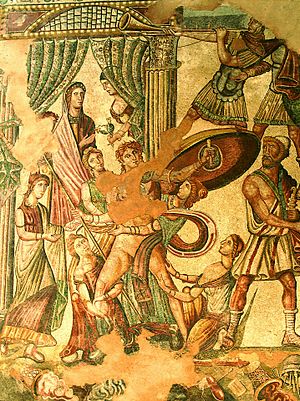
A prophecy said the Trojan War could not be won without Achilles. So, Odysseus and other Greek leaders went to Skyros to find him. Odysseus found Achilles by offering gifts to the king's daughters. These gifts included jewelry, musical instruments, and weapons. Then, Odysseus's friends made sounds like an enemy attack. Achilles immediately grabbed a weapon to fight back, revealing himself. They then left for the Trojan War.
There are different stories about how Palamedes died. Some say Odysseus never forgave Palamedes for exposing his feigned madness. Odysseus played a part in Palamedes' downfall. One story says Odysseus tricked a Trojan prisoner into writing a letter. The letter pretended to be from Palamedes and mentioned gold as a reward for his betrayal. Odysseus then killed the prisoner and hid the gold in Palamedes' tent. He made sure the letter was found by Agamemnon and gave hints about the gold. This was enough proof for the Greeks, and they had Palamedes killed.
Odysseus and Diomedes also brought Achilles' son, Pyrrhus, to help the Greeks. An oracle had said Troy could not be taken without him. Pyrrhus was a great warrior and was also called Neoptolemus, meaning "new warrior." After their mission succeeded, Odysseus gave Achilles' armor to Pyrrhus.
The Greeks learned that the war could not be won without the poisonous arrows of Heracles. These arrows were owned by Philoctetes, who had been left behind. Odysseus and Diomedes went to get them. When they arrived, Philoctetes was still angry at the Greeks, especially Odysseus, for abandoning him. He first wanted to shoot Odysseus. But Odysseus's persuasive words and the gods' influence calmed his anger. Odysseus returned to the Greek camp with Philoctetes and his arrows.
Perhaps Odysseus's most famous idea was the Trojan Horse. This strategy allowed the Greek army to sneak into Troy at night. The horse was built by Epeius and filled with Greek warriors, led by Odysseus. Odysseus and Diomedes also stole the Palladium from inside Troy's walls. The Greeks were told they could not capture the city without it.
Journey Home to Ithaca
Odysseus is most famous as the hero of the Odyssey. This epic poem tells the story of his difficult journey. It lasted for 10 years as he tried to return home after the Trojan War. He wanted to reclaim his place as the rightful king of Ithaca.
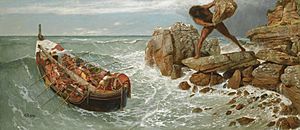
On his way home from Troy, after a raid on Ismarus, storms blew Odysseus and his twelve ships off course. They visited the lazy Lotus-Eaters. Then, they were captured by the Cyclops named Polyphemus on his island. After some of his men were eaten, Odysseus talked to Polyphemus. Odysseus told the Cyclops his name was "Nobody." Odysseus gave Polyphemus a barrel of wine, and the Cyclops drank it and fell asleep. Odysseus and his men sharpened a wooden stake, heated it, and blinded the Cyclops. As they escaped, Polyphemus cried out in pain. Other Cyclopes asked what was wrong. Polyphemus shouted, "Nobody has blinded me!" The other Cyclopes thought he had gone mad. Odysseus and his crew escaped. But Odysseus foolishly revealed his real name. Polyphemus then prayed to his father, Poseidon, to get revenge.
They stayed with Aeolus, the master of the winds. He gave Odysseus a leather bag containing all the winds, except the west wind. This gift should have ensured a safe trip home. However, while Odysseus slept, his sailors foolishly opened the bag. They thought it contained gold. All the winds flew out, and a storm blew the ships back the way they had come. This happened just as Ithaca came into sight.
After begging Aeolus in vain for more help, they sailed on. They met the Laestrygonians, who were giants. Odysseus's ship was the only one to escape. He then sailed to the island of the witch-goddess Circe. She turned half of his men into pigs after feeding them cheese and wine. Hermes warned Odysseus about Circe and gave him a special herb called moly. This herb protected him from Circe's magic. Circe was impressed by Odysseus's resistance. She fell in love with him and released his men. Odysseus and his crew stayed with her on the island for one year, feasting and drinking. Finally, Odysseus's men convinced him to leave for Ithaca.
Following Circe's instructions, Odysseus and his crew crossed the ocean. They reached a harbor at the edge of the world. There, Odysseus made sacrifices to the dead. He summoned the spirit of the old prophet Tiresias for advice. Next, Odysseus met the spirit of his own mother. She had died of sadness during his long absence. From her, he learned about his home for the first time. His household was threatened by Penelope's many suitors. Odysseus also spoke to his fallen war friends and the spirit of Heracles.
Odysseus and his men returned to Circe's island. She advised them on the rest of their journey. They sailed past the land of the Sirens. Then, they passed between the six-headed monster Scylla and the whirlpool Charybdis. They rowed directly between them. However, Scylla grabbed the oars and ate six men.
They landed on the island of Thrinacia. There, Odysseus's men ignored the warnings of Tiresias and Circe. They hunted and ate the sacred cattle of the sun god Helios. Helios told Zeus what happened. He demanded that Odysseus's men be punished, or he would take the sun to the Underworld. Zeus granted Helios's wish. He caused a shipwreck during a thunderstorm, and all of Odysseus's men drowned. Only Odysseus survived. He washed ashore on the island of Ogygia. There, Calypso forced him to stay with her for seven years. He finally escaped when Hermes told Calypso to release him.
Odysseus was shipwrecked again. He was befriended by the Phaeacians. After he told them his story, the Phaeacians, led by King Alcinous, agreed to help him get home. They delivered him at night, while he was fast asleep, to a hidden harbor on Ithaca. He found his way to the hut of one of his old slaves, the swineherd Eumaeus. He also met up with Telemachus, who was returning from Sparta. Athena disguised Odysseus as a wandering beggar. This way, he could learn what was happening in his household.
When the disguised Odysseus returned after 20 years, only his faithful dog, Argos, recognized him. Penelope announced a contest. Whoever could string Odysseus's stiff bow and shoot an arrow through twelve axe shafts could marry her. This decision was a turning point in the Odyssey. Odysseus's identity was discovered by his old housekeeper, Eurycleia. She was washing his feet and found an old scar he got during a boar hunt. Odysseus made her promise to keep his secret, threatening to kill her if she told anyone.
When the bow contest began, none of the suitors could string the bow. After they all gave up, the disguised Odysseus asked to try. The suitors refused at first. But Penelope stepped in and allowed the "stranger" to participate. Odysseus easily strung his bow and won the contest. Odysseus then revealed himself in all his glory, with a little help from Athena. Yet, Penelope could not believe her husband had truly returned. She feared it might be a god in disguise. So, she tested him. She ordered her servant Euryclea to move the bed in their wedding-chamber. Odysseus protested that this was impossible. He had made the bed himself, and one of its legs was a living olive tree. Penelope finally accepted that he was truly her husband. This moment showed their "like-mindedness."
Odysseus's Children
Some later stories say Odysseus had many other children besides Telemachus. Most of these stories tried to connect Odysseus to the founding of many cities in Italy. The most famous children are:
- With Penelope: Poliporthes (born after Odysseus returned from Troy).
- With Circe: Telegonus, Ardeas, Latinus, and also Ausonus and Casiphone. One historian, Xenagoras, wrote that Odysseus and Circe had three sons: Romos, Anteias, and Ardeias. These sons built three cities and named them after themselves. The city Romos founded was Rome.
- With Calypso: Nausithous, Nausinous.
- With Callidice: Polypoetes.
- With Euippe: Euryalus.
- With the daughter of Thoas: Leontophonus.
See also
 In Spanish: Odiseo para niños
In Spanish: Odiseo para niños
 | Tommie Smith |
 | Simone Manuel |
 | Shani Davis |
 | Simone Biles |
 | Alice Coachman |


